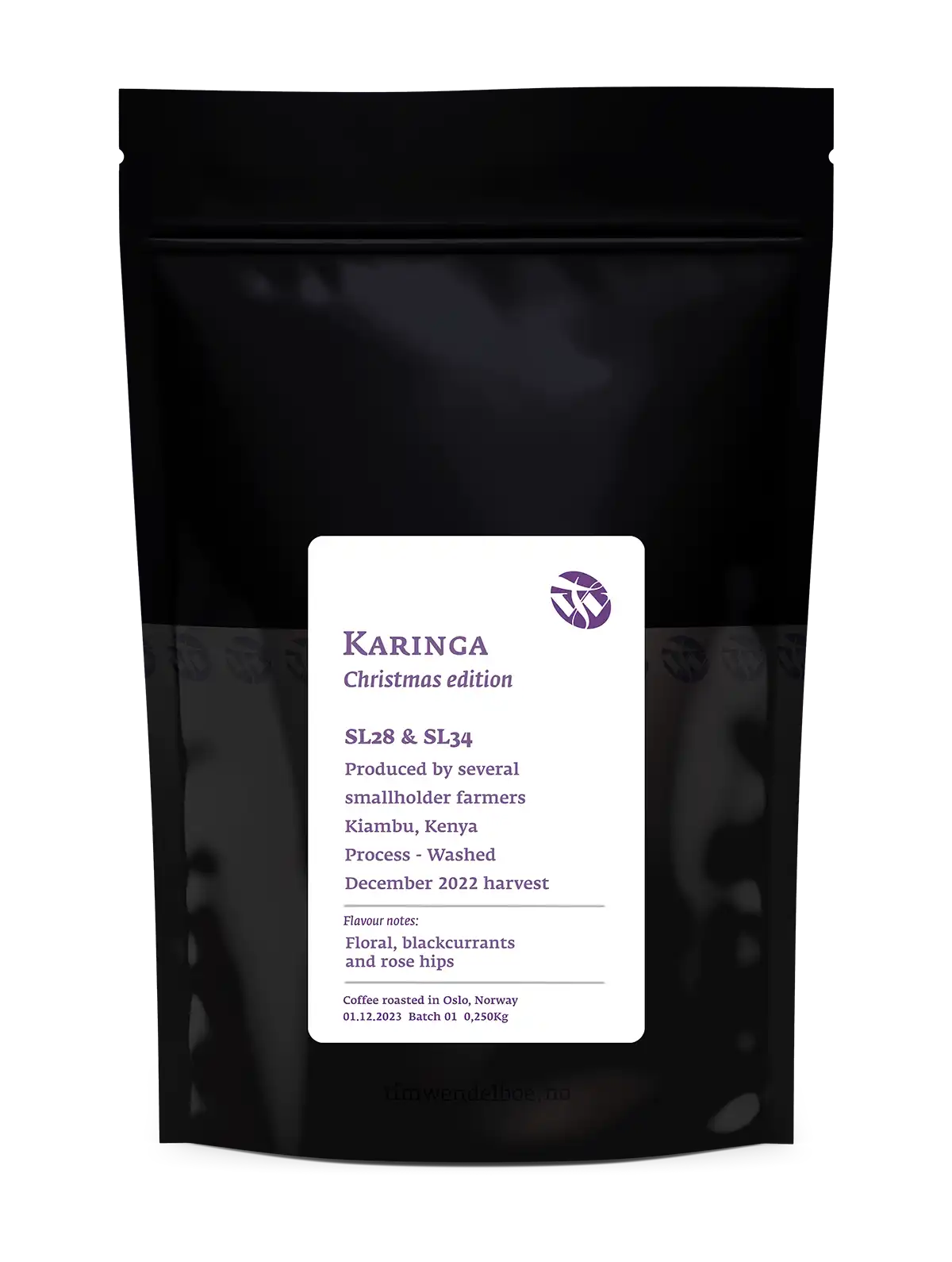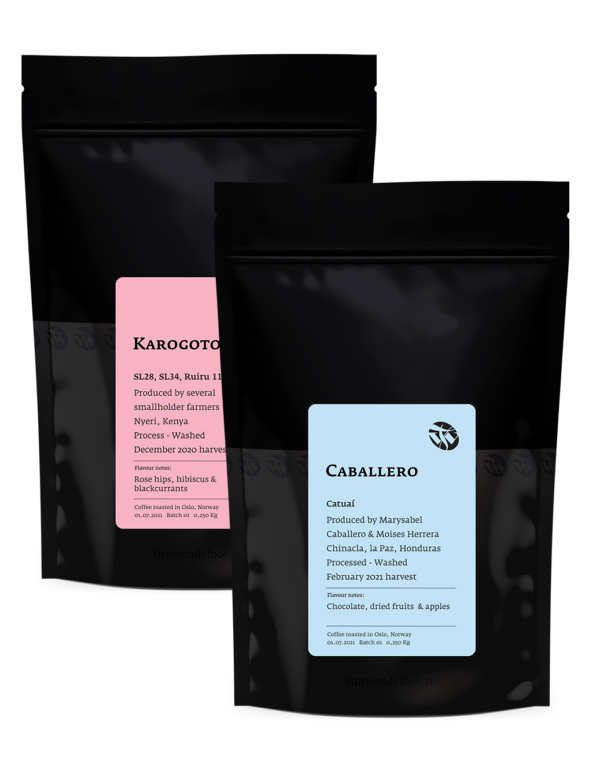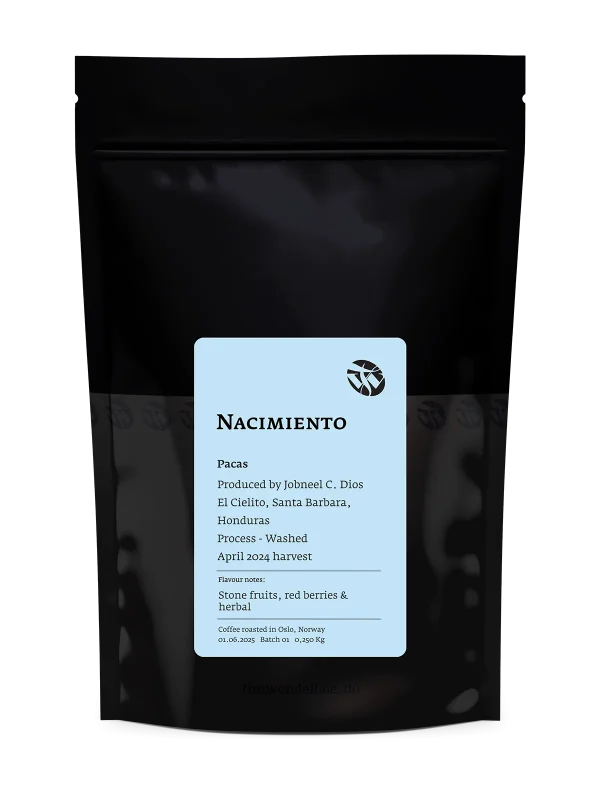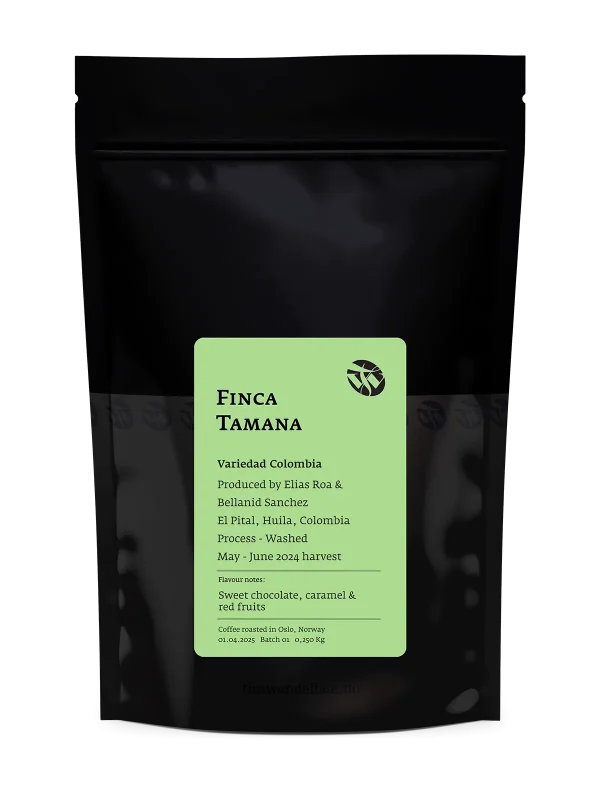| Cultivar | SL28 & SL34 |
|---|---|
| Flavour Notes | Floral, blackcurrants & rose hips |
| Producer | Several smallholders farmers |
| Country | Kenya |
| Region | Kiambu |
| Process | Washed |
| Harvest | December 2022 |
| Roast Profile | Light Roast |
| Contents | Whole Coffee Beans |
| Bag Size | 250g |
Karinga
kr195.00
A classic Kenyan coffee with a distinct and intense fruity flavour and a refreshing acidity. Expect intense notes of blackcurrants and rose hips with delicate floral aromas.
Out of stock
Additional information
Tim's Notes
This coffee is grown at around 1900 masl in Kiambu where the climate is cool and makes the coffee ripen slower and develop more flavour, sweetness and acidity.
Most of the members who sell their coffee cherries to this wet mill grow mainly the SL28 cultivar (with some growing SL34) because of good yields and exceptional quality in high altitudes. The majority of the farmers in this area have therefore been reluctant to plant the newer rust tolerant hybrids Batian and Ruiru 11 which are becoming more common in lower altitudes in Kenya.
For me this coffee has been a standout for several years when I have been tasting coffees in Kenya because of its intensity of flavour. It has a crisp acidity and an intense fruity and floral character that makes it both intense and elegant at the same time.
Most of the members who sell their coffee cherries to this wet mill grow mainly the SL28 cultivar (with some growing SL34) because of good yields and exceptional quality in high altitudes. The majority of the farmers in this area have therefore been reluctant to plant the newer rust tolerant hybrids Batian and Ruiru 11 which are becoming more common in lower altitudes in Kenya.
For me this coffee has been a standout for several years when I have been tasting coffees in Kenya because of its intensity of flavour. It has a crisp acidity and an intense fruity and floral character that makes it both intense and elegant at the same time.
Cultivar
SL28 is one of the most popular cultivars grown in Kenya because of its high yields and superior quality in the cup. It is no secret that I love this fruity cultivar that at its best taste like black currant juice, rhubarb or rose hip tea. SL28 was a selection made by the Scott Agricultural Laboratories in the 1930's and along with the SL34 cultivar it is the most commonly grown cultivar in Kenya and an important reason why everyone thinks about fruity coffees when they speak of Kenyan coffees.
Process
Picking and sorting
- The coffee cherries are typically hand picked by the farmers and their family members. After delivering the coffee cherries to the wet mill the good coffee cherries are separated from the inferior ones by hand sorting and they are delivered in separate cherry hoppers.
- The cherries are depulped and graded by using an old Aagard disc de-pulper that uses water and gravity to sort dense beans from less dense beans. Coffee of different grades are moved to separate fermentation tanks where the parchment coffee, with it’s mucilage still on, is dry fermented for about 12-36 hours over night. After fermentation the coffee is washed in clean water and graded once again by gravity. The more dense beans are dried separately from the beans with lower density and inferior quality.
- The coffees are dried on elevated drying tables, where defect parchment coffee gets sorted out by hand. Drying the coffee takes about 10 – 14 days. During daytime the coffees are raked to ensure even drying. The drying tables are covered during the hottest times of the day to avoid over heating and also at night time to prevent condensation. The drying process is finished when the moisture content in the coffee beans is between 10-12%. After drying, the coffees are stored in conditioning bins before delivery to the dry mill. The coffees we buy from Kenya are always vacuum packed before they are shipped to Norway.
Shipping
For our Norwegian customers, we offer three shipping options:
- Pakke i Postkassen - With Pakke i Postkassen, tracking is provided, and delivery is estimated within 2-3 business days.
- Pakke til hentested - The parcel can be collected from a Post in Store, Post Office, parcel locker, or parcel box. This option includes tracking, with delivery expected within 1-5 business days.
- Norwegian Post, No Tracking (Brevpost) - This option does not offer tracking. Delivery is estimated within 2-5 business days.
How To Brew
Filter
- We strongly recommend using the correct measurements and brewing techniques when you brew our coffees. Use a digital scale both to measure water and coffee in order to get consistent results, and we recommend using between 60 to 70 grams of coffee per litre (1000g) of water, depending on the brewing method, water quality and coffee used.
- We strongly recommend using VST filter baskets. Both the 18g, 20g and the 22g basket is great for our coffee. The VST filters makes it a lot easier to extract the espresso properly which gives a lot more sweetness in the cup. They are also more or less identical to each other which makes it easy to be more consistent when brewing on several groups at the same time. You can buy the filters on our webshop, just make sure they fit your machine (ours fits all La Marzocco machines and machines with 58mm filter baskets). With the VST 18g filter basket, we recommend the following brewing parameters: 18-19g freshly-ground coffee, 25-35s brewing time, 35-38g of final brew liquid in the cup, 93°C-94°C brew water temperature.




